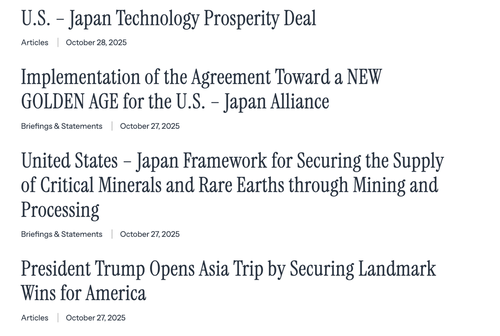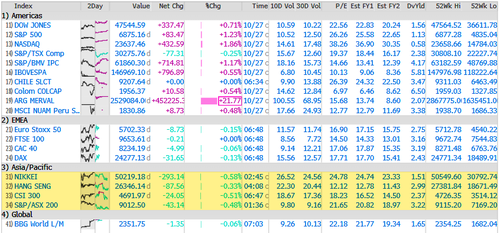Trump Praises Japan As Key Ally, Signs Rare-Earths Deal And U.S. Investment Boost
President Trump’s second stop on his three-country Asia tour was Japan, where he met overnight with newly elected conservative Prime Minister Sanae Takaichi and reaffirmed the U.S.-Japan alliance. He praised Takaichi’s plans to boost defense spending to 2% of GDP and pledged unwavering U.S. support, calling the partnership “an ally at the strongest level.”
“I want to just let you know anytime you have any question, any doubt, anything you want, any favors you need, anything I can do to help Japan, we will be there,” Trump said. “We are an ally at the strongest level.”
“Anything I can do to help Japan, we will be there.”
President Trump congratulated Japan’s first woman Prime Minister Sanae Takaichi, calling the U.S. an ally of the country “at the strongest level.” pic.twitter.com/aXJkNsNdhx
— Fox News (@FoxNews) October 28, 2025
“We’re going to do tremendous trade together, I think, more than ever before,” Trump said, adding that he expected the U.S.-Japan relationship would be “stronger than ever before.”
PM Takaichi gifts President @realDonaldTrump a golf bag signed by Hideki Matsuyama and Prime Minister Abe’s putter ❤️⛳️ pic.twitter.com/YlaYnfr846
— Margo Martin (@MargoMartin47) October 28, 2025
Trump and Takaichi signed deals on trade and critical minerals, largely formalizing and extending prior agreements. At the center of the deals was a $550 billion Japanese investment pledge for U.S. projects.
The first agreement, which was very brief, called for a “new golden age” in the U.S.-Japan alliance and referred to the “GREAT DEAL” on trade that Trump announced in July, which imposes a 15% tariff on Japanese goods in exchange for $550 billion in Japanese investment in the United States.-NBC
PM Takaichi: “I held a summit meeting and a signing ceremony with President Trump of the United States. I expressed my determination to restore robust Japanese diplomacy with the Japan-U.S. Alliance as its cornerstone. President Trump and I agreed to strongly (1/2) pic.twitter.com/KLb5nH35l9
— PM’s Office of Japan (@JPN_PMO) October 28, 2025
Trump framed the fund as one the U.S. could “invest as we like,” while Japan described it as loans and guarantees backing Japanese firms’ U.S. operations. Both sides emphasized coordination on permitting, financing, and resource mapping, but the White House acknowledged that the agreements remain ill-defined.
Headlines from the White House:
Additional headlines from earlier:
-
Trump thanked Japan for its massive investment commitments and highlighted Toyota’s ongoing expansion in the U.S., noting the automaker is “putting auto plants all over the United States to the tune of over $10 billion.”
-
The U.S. president also highlighted America’s renewed push to rebuild its shipbuilding industry, remarking, “We used to be No. 1 at making ships, and then we lost our way. But now we’re starting to make ships again, and we’ll do it very soon.” Trump cited last year’s $100 million acquisition of the Philly Shipyard by South Korea’s Hanwha Group as a key step toward modernizing U.S. shipbuilding capacity.
U.S. Treasury Secretary Scott Bessent and Japanese Finance Minister Satsuki Katayama also met. Here’s a summary of that via UBS analyst Simon Penn:
U.S. Treasury Secretary Scott Bessent seemed to be more diplomatic towards the BoJ in his face-to-face meetings in Tokyo than he’s previously been when at home. The U.S. Treasury Department reported that during his meeting with Japanese finance minister Katayama he said there was a need for “sound monetary policy formulation and communication in anchoring inflation expectations.” In the past Bessent had complained that the BoJ was getting behind the curve with policy relative to inflation. In his Tokyo meetings, he still made his point, but was careful in approach. The Treasury Department said he had told Katayama that economic conditions were very different today compared to a twelve years ago and the introduction of Abenomics when the BoJ’s ultra easy policy was the third arrow of economic support.
Even with these high-level trade meetings, Asian markets traded more softly this morning, led by weakness in technology stocks. South Korea and Taiwan underperformed, while Chinese equities remained rangebound. Japan’s market consolidated, with the Nikkei closing down a little more than half a percent.
World equity stock indexes
Tomorrow, Trump heads to South Korea, where he will meet with Chinese President Xi Jinping later this week.
Tyler Durden
Tue, 10/28/2025 – 07:05ZeroHedge NewsRead More






 R1
R1
 T1
T1


